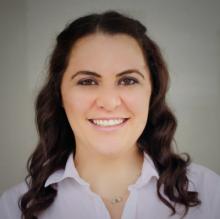Tasha Wainstein
Why did you decide to pursue a graduate degree?
I spent six years in clinical practice as a genetic counsellor in South Africa and this experience fuelled my research activities and provided the motivation to pursue a PhD. Throughout my clinical experience, the lack of knowledge and research regarding the care of adolescents with genetic conditions became apparent and I am driven to fill this gap with primary and translational research. My PhD goals are firmly rooted in my clinical experience of unmet patient needs - this inspires me as a student and future independent researcher.
Why did you decide to study at UBC?
UBC was an immediately attractive choice for my PhD studies based on its outstanding reputation as an academic institution, in particular as a research-intensive university. Once I arrived in Vancouver late in 2018, and had the opportunity to interact with scientists, researchers, genetic counsellors, and others in the Department of Medical Genetics, I realized that it would be a vibrant training environment with many learning and networking opportunities. Conveniently, it is also located in one of the most beautiful cities in the world.
What is it specifically, that your program offers, that attracted you?
Simply put: the people! The research faculty in the Department of Medical Genetics provide an environment that is conducive to learning, research, and knowledge translation. In my specific case, I have found that my desire to undertake research as a primary career choice within the profession of genetic counselling has been particularly well supported. Opportunities for collaboration outside of the program and Department and with researchers from other fields has also been extremely valuable in expanding my network, and I am grateful that this has been facilitated and encouraged.
What was the best surprise about UBC or life in Vancouver?
There is a wealth of rhetoric online and in the public discourse about the challenges of academia, especially for graduate students. I was pleasantly surprised to find that my mental health and wellbeing is as great of a concern to my supervisors, the graduate advisor, the graduate program assistant, and others, as any other aspect of my research experience.
What aspects of your life or career before now have best prepared you for your UBC graduate program?
Being involved in research both during my undergraduate training and my career as a genetic counsellor gave me a lot of insight about the process of research. Training as a genetic counsellor also placed emphasis on the ability to be self reflexive and this has been an invaluable skill throughout my graduate experiences thus far.
What advice do you have for new graduate students?
The graduate experience can be isolating; it is important to find a community of peers with whom you can connect about your experiences. It's also important to find that ever-elusive work/life balance and not be sucked into the idea that graduate students who aren't working 80 hours a week are in some way failing. It's also useful to remind yourself that you have proven that you are worthy of being in your program just by being accepted and that you add value to your program, Department, and peers outside of your academic achievements.
